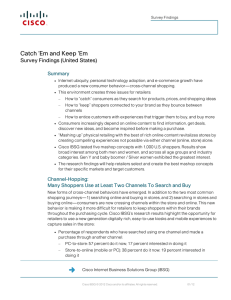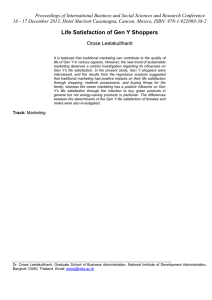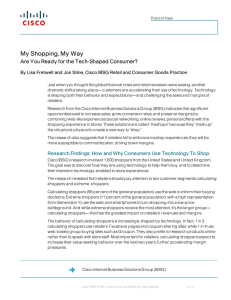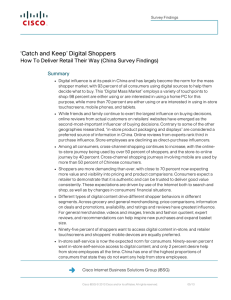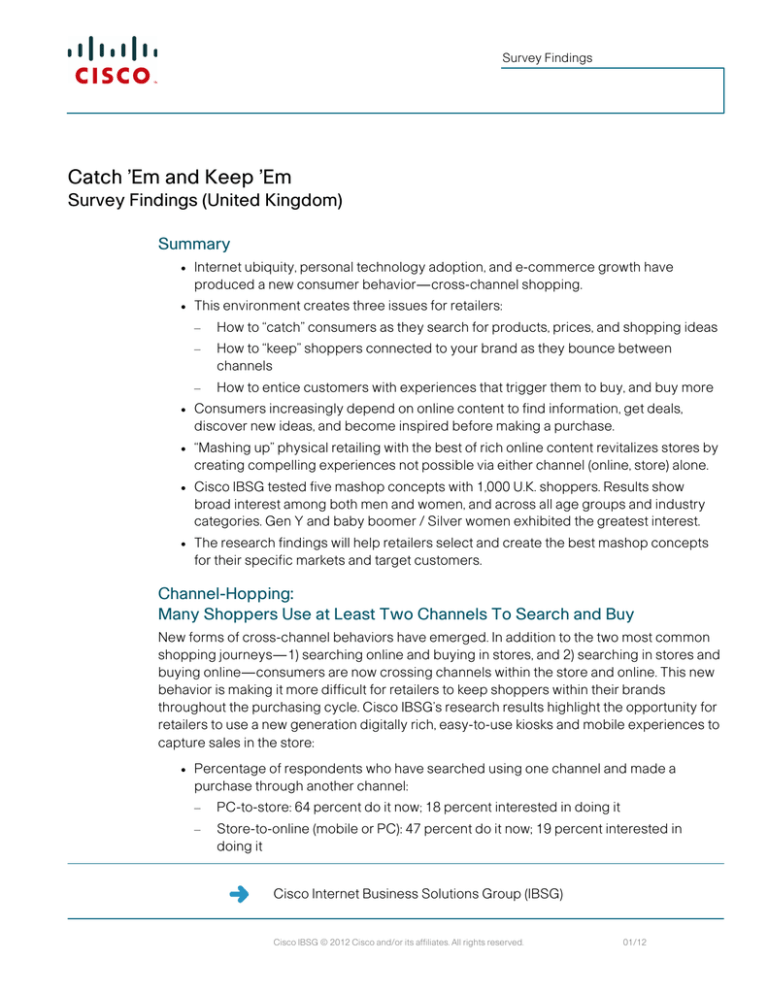
Survey Findings
Catch ’Em and Keep ’Em
Survey Findings (United Kingdom)
Summary
●
●
●
●
●
●
Internet ubiquity, personal technology adoption, and e-commerce growth have
produced a new consumer behavior—cross-channel shopping.
This environment creates three issues for retailers:
–
How to “catch” consumers as they search for products, prices, and shopping ideas
–
How to “keep” shoppers connected to your brand as they bounce between
channels
–
How to entice customers with experiences that trigger them to buy, and buy more
Consumers increasingly depend on online content to find information, get deals,
discover new ideas, and become inspired before making a purchase.
“Mashing up” physical retailing with the best of rich online content revitalizes stores by
creating compelling experiences not possible via either channel (online, store) alone.
Cisco IBSG tested five mashop concepts with 1,000 U.K. shoppers. Results show
broad interest among both men and women, and across all age groups and industry
categories. Gen Y and baby boomer / Silver women exhibited the greatest interest.
The research findings will help retailers select and create the best mashop concepts
for their specific markets and target customers.
Channel-Hopping:
Many Shoppers Use at Least Two Channels To Search and Buy
New forms of cross-channel behaviors have emerged. In addition to the two most common
shopping journeys—1) searching online and buying in stores, and 2) searching in stores and
buying online—consumers are now crossing channels within the store and online. This new
behavior is making it more difficult for retailers to keep shoppers within their brands
throughout the purchasing cycle. Cisco IBSG’s research results highlight the opportunity for
retailers to use a new generation digitally rich, easy-to-use kiosks and mobile experiences to
capture sales in the store:
●
Percentage of respondents who have searched using one channel and made a
purchase through another channel:
–
PC-to-store: 64 percent do it now; 18 percent interested in doing it
–
Store-to-online (mobile or PC): 47 percent do it now; 19 percent interested in
doing it
Cisco Internet Business Solutions Group (IBSG)
Cisco IBSG © 2012 Cisco and/or its affiliates. All rights reserved.
01/12
Survey Findings
–
Kiosk-to-store (immediate in-store sale): 39 percent do it now; 26 percent
interested in doing it
–
Kiosk-to-store (later in-store pickup): 31 percent do it now; 27 percent interested in
doing it
–
Kiosk-to-store (delivery to location of choice): 23 percent do it now; 29 percent
interested in doing it
–
Mobile-to-store: 23 percent do it now; 23 percent interested in doing it
–
Mobile-to-PC: 27 percent do it now; 22 percent interested in doing it
Technology and Digital Content Influence Four “Buying Triggers”
Shoppers currently use or are interested in using a variety of technologies and digital
content in conjunction with the four buying triggers that drive purchases: find, best deal,
discover, and inspire. (Note: buying triggers are experiences that cause customers to move
from thinking about buying to actually making the purchase.) Cisco IBSG’s research
identifies the significant value that consumers attribute to digital buying and solution guides,
videos, and personalized recommendations in helping them make better purchasing
decisions.
●
●
●
●
Find: Finding the right product. Key elements include information, price, product,
location, and availability.
–
Retailer websites: 74 percent use now; 17 percent interested in using
–
Social networks: 30 percent use now; 15 percent interested in using
–
Mobile apps: 19 percent use now; 25 percent interested in using
Best deal: Getting the best price. Key elements include price, offers, rewards, and
scarcity.
–
Retailer websites: 75 percent use now; 16 percent interested in using
–
Price-comparison sites: 55 percent use now; 22 percent interested in using
–
Coupon sites: 22 percent use now; 30 percent interested in using
–
Social networks: 26 percent use now; 17 percent interested in using
Discover: Finding the right product to address a specific want or need, and learning
how to use a product so it becomes a solution.
–
Online retailer recommendations: 59 percent use now; 23 percent interested
in using
–
Online buying guides: 36 percent use now; 38 percent interested in using
–
Online solution guides: 26 percent use now; 36 percent interested in using
–
Online videos: 32 percent use now; 26 percent interested in using
Inspire: Buying something that is “uniquely you.” Key elements include joining the
in-crowd, starting a trend, or buying something others will covet or aspire to.
–
Online retailer recommendations: 54 percent use now; 23 percent interested
in using
–
Online buying guides: 30 percent use now; 37 percent interested in using
–
Online solution guides: 22 percent use now; 35 percent interested in using
Cisco IBSG © 2012 Cisco and/or its affiliates. All rights reserved.
Page 2
Survey Findings
–
Online videos: 28 percent use now; 26 percent interested in using
In-Store Digital Screens Influence What People Buy
Respondents showed growing interest in using interactive, visual content to help them make
buying decisions:
●
Kiosk in store: 23 percent use now; 32 percent interested in using
●
Digital screens in store: 18 percent use now; 29 percent interested in using
●
Video walls in store: 12 percent use now; 29 percent interested in using
●
Mobile phones in store: 16 percent use now; 22 percent interested in using
●
Tablet PCs in store: 8 percent use now; 29 percent interested in using
Mashop Concept Tests
Cisco IBSG tested five mashop concepts to determine shoppers’ overall interest in each
solution. The research also explored how the concepts encouraged shoppers to make
purchases as well as which elements of the experience (for example, content, endpoints,
devices) shoppers found most useful. Survey results show broad interest in the five mashop
concepts among men and women. More specifically, Silver men were less enthusiastic while
Gen Y men and Gen Y through baby boomer women were most interested. Gen X displayed
solid interest in the mashop concepts, with Gen X women being the most enthusiastic.
Immersive experiences: Allow shoppers to visualize themselves in different
environments wearing various combinations of products (for example, trying on
clothes and accessories virtually, or experimenting with furniture designs, fabrics,
and colors in a living room).
•
●
●
●
●
–
Most popular concept overall.
–
High interest from women of all ages; Gen Y / baby boomers stand out.
Product viewer: Large, interactive screen provides product information, views,
directions to find products, and product reviews.
–
Interest from Gen X and Gen Y men, and Gen X, Gen Y, and baby boomer women.
–
Side-by-side comparisons are a top feature.
Shelf help: Ability to see product information, videos, and comparisons at the shelf
edge. In addition, allows customers to speak with an expert virtually via video.
–
Most consistent appeal across all age segments.
–
Video expert is “important” to “very important” for nearly one-third of shoppers.
Personal mobile shopper: Delivers personalized offers (based on transaction history)
to customers’ mobile phones
–
Biggest hit with Gen Y women and men.
–
Thirty-one percent of Gen Y would be more interested if this capability made
personalized recommendations and offers based on products and services that
shoppers “liked” on Facebook or asked about on Twitter.
–
Thirty-six percent of shoppers want to tell retailers when they’re ready to buy.
Shopper favorites: Large in-store screen shows products rated by popularity, sales,
votes, and “likes.”
Cisco IBSG © 2012 Cisco and/or its affiliates. All rights reserved.
Page 3
Survey Findings
–
Thirty-five percent of shoppers want limited-time, in-store specials on the screen.
–
Gen Y most interested.
–
Older shoppers want directions to products in store and ability to scan bar codes
on screen for more information.
–
Social network integration (sharing “likes” and recommendations) popular with Gen
X / Gen Y.
Survey Demographics
●
1,000 U.K. consumers
●
Ages:
●
●
–
18 to 29: 28 percent
–
30 to 39: 19 percent
–
40 to 49: 21 percent
–
50 to 59: 15 percent
–
60+: 16 percent
Ages by generation:
–
Gen Y: 18-29
–
Gen X: 30-49
–
Baby boomers: 50-64
–
Silvers: 65 and older
Gender
–
Male: 49 percent
–
Female: 51 percent
For More Information
Contact Lisa Fretwell (lfretwel@cisco.com) or Jon Stine (jostine@cisco.com) of Cisco IBSG’s
Global Retail Practice.
Cisco IBSG © 2012 Cisco and/or its affiliates. All rights reserved.
Page 4

